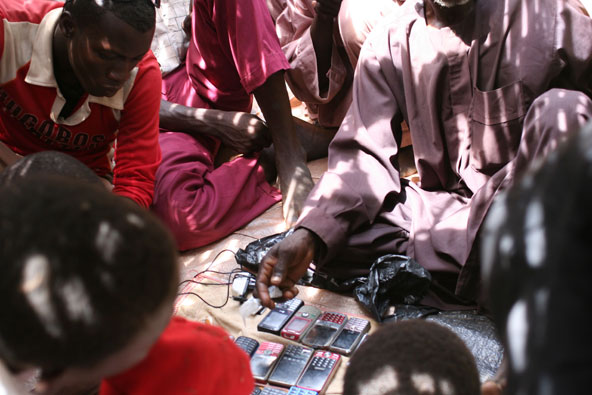
Even in the most remote of villages Niger, the familiar sound of a cell phone’s default ringtone can still interrupt a business meeting.
Their motive for carrying one, however, is far less about keeping tabs on their family and fellow village members than it is about something more pressing. It’s simply about learning. That in turn will combat the more than 70 percent illiteracy rate in the West African nation. And their newfound knowledge ultimately contributes to survival.
Catholic Relief Services, in partnership with the third world country’s education sector, has incorporated cell phone technology into traditional literacy activities for the last several years. Project ABC, or Project Alphabetisation de Base par Cellulaire, also brings Tufts University and the University of Oxford into the partnership, which has borne its share of fruit.
The adult literacy classes use both the traditional blackboard for learning and a special multimedia cell phone. A voice from inside the phone sounds out letters — local languages of Hausa and Zarma use the Roman alphabet and are phonetic — while the screen displays it.
Four-month classes don’t make the adults super readers, but it’s a start. Sounds become simple words and numbers. Then, with a bit of self-imposed study, the farmers-turned-students can better compete at the local market.
The cell phones use FrontlineSMS technology to allow farmers and consumers to request price information using simple codes. They can check on any of Niger’s nine most popular crops. Nigeriens largely produce millet, peanuts, beans and sesame. They’re among the world’s largest producer and exporter of okra.
Project ABC impacts more than 110 villages in the Dosso and Zinder regions of Niger, which is in the southwestern and southern parts, respectively, of the country. The better-known country of Nigeria sits to the south.
Back north in Niger, which consistently ranks second to the bottom in the human development index and has the world’s highest birthrate, Project ABC is making a difference. Literacy centers draw 50 students, equally split between men and women. They leave knowing the value of a pen and better able to calculate cost benefit analyses.
Goma Toudou, one of the village women who spoke with The Catholic Sun, said the literacy efforts such as teaching them to see and recognize their own name or village name sounds simple, but that knowledge is power. It helps them tell if someone is trying to trick them in a business deal.
“If it wasn’t for this project, half of them would be in Nigeria now,” Goma Bouda said of U.S. assistance.
There they’d sell water door to door and would make just enough to eat for the day.
“This year if you see people in the village, it’s because Catholic Relief Services has given them a way to stay,” a village person in one of Niger’s most chronically food insecure areas said.
Villagers spoke of one woman who left looking for work several years ago and hasn’t been back. CRS has helped care for her children.
One man spent more than 13 years doing manual labor in Ghana before a brother who stayed behind encouraged him to return. Catholic Relief Services had a Cash for Work program going on locally.






